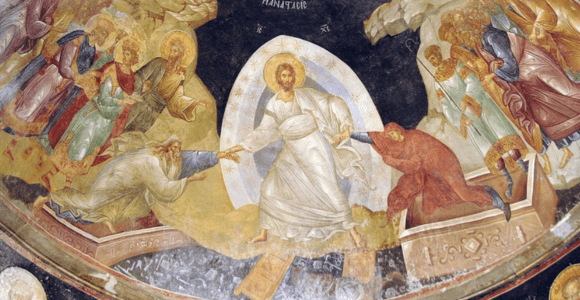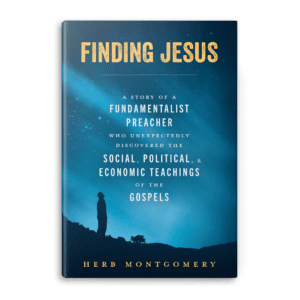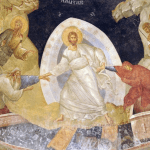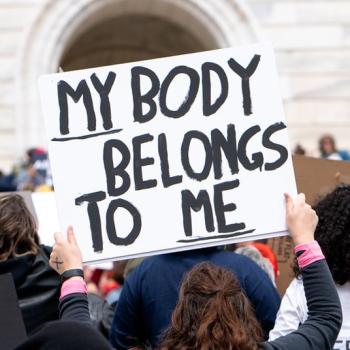
Again, in the spirit of those in our lectionary reading for whom the good news was that Jesus was alive, I want to share a small collection of encouraging quotations from other theologians who have deeply encouraged for me, and who have come to your same conclusion.
Welcome Readers! Please subscribe to Social Jesus Here.
(Read this series from the beginning at Part 1 and Part 2.)
Kelly Brown Douglass gets us started:
“Jesus takes on evil. He takes on and defeats . . . not granting the power of death any authority over him . . . he does not respond in kind, by adopting the methods of this power. The final triumph over the death of the cross is the resurrection of Jesus . . . The resurrection is God’s definitive victory over the crucifying powers of evil . . . The cross represents the power that denigrates human bodies, destroys life, and preys on the most vulnerable in society. As the cross is defeated, so too is that power [defeated] by life-giving rather than a life-negating force . . . That is, it is not the power that diminishes the life of another so that others might live. God’s power respects the integrity of all human bodies and the sanctity of all life. This is a resurrecting power . . . God’s power never expresses itself through humiliation or denigration of another. It does not triumph over life. It conquers death by resurrecting life . . . If indeed the power of life that God stands for is greater than the power of death, this must be manifest in the way God triumphs over death-dealing powers. The freedom of God that is life requires a liberation from the very weapons utilized by a culture of death. In other words, these weapons cannot become divine weapons . . . The culmination of this liberation is Jesus’ resurrection.” (Stand Your Ground: Black Bodies and the Justice of God, p. 181-182)
Next is from Delores Williams:
“It seems more intelligent and more scriptural to understand that redemption had to do with God, through Jesus, giving humankind new vision to see the resources for positive, abundant relational life. Redemption had to do with God, through the ministerial vision, giving humankind the ethical thought and practice upon which to build positive, productive quality of life. Hence, the kingdom of God theme in the ministerial vision of Jesus does not point to death; it is not something one has to die to reach. Rather, the kingdom of God is a metaphor of hope God gives those attempting to right the relations between self and self, between self and others, between self and God as prescribed in the sermon on the mount, in the golden rule and in the commandment to show love above all else. (Sisters in the Wilderness: The Challenge of Womanist God-Talk, pp. 130-131)
Lastly is a passage from Joanne Carlson Brown and Rebecca Parker:
“Suffering is never redemptive, and suffering cannot be redeemed. The cross is a sign of tragedy. God’s grief is revealed there and everywhere and every time life is thwarted by violence. God’s grief is as ultimate as God’s love. Every tragedy eternally remains and is eternally mourned. Eternally the murdered scream, Betrayal. Eternally God sings kaddish for the world. To be a Christian means keeping faith with those who have heard and lived God’s call for justice, radical love, and liberation; who have challenged unjust systems both political and ecclesiastical; and who in that struggle have refused to be victims and have refused to cower under the threat of violence, suffering, and death. Fullness of life is attained in moments of decision for such faithfulness and integrity. When the threat of death is refused and the choice is made for justice, radical love, and liberation, the power of death is overthrown. Resurrection is radical courage. Resurrection means that death is overcome in those precise instances when human beings choose life, refusing the threat of death. Jesus climbed out of the grave in the Garden of Gethsemane when he refused to abandon his commitment to the truth even though his enemies threatened him with death. On Good Friday, the Resurrected One was Crucified” (In For God So Loved the World?)
Maybe there are so many atonement theories that fail to adequately explain how Jesus death saves because it doesn’t save. Maybe our questions as to how Jesus’ death saves go unanswered because we are asking the wrong question. I, like the scholars mentioned above, find much more life in focusing on the intrinsic, saving value of the teachings of Jesus. For me, this intrinsic salvific value is life-giving good news.
The resurrection story elements in the gospels tell me that violence, bigotry, misogyny, patriarchy, racism, homophobia, biphobia, transphobia, classism, authoritarianism, environmental destruction, and a host of other injustices in our world today don’t have to have the last word. They may interrupt our work of shaping our world into a safe, compassionate, just home for all, but if we keep at it, they will just be interruptions. Love can transform hate. Elements of our communities and societies that are death-dealing can be undone by our choosing things that are life-giving. Death and injustice don’t have to have the last word.
For me, in the wake of Easter, this is much needed good news.
 Herb’s new book, Finding Jesus: A story of a fundamentalist preacher who unexpectedly discovered the social, political, and economic teachings of the Gospels, is now available at Renewed Heart Ministries.
Herb’s new book, Finding Jesus: A story of a fundamentalist preacher who unexpectedly discovered the social, political, and economic teachings of the Gospels, is now available at Renewed Heart Ministries.
















